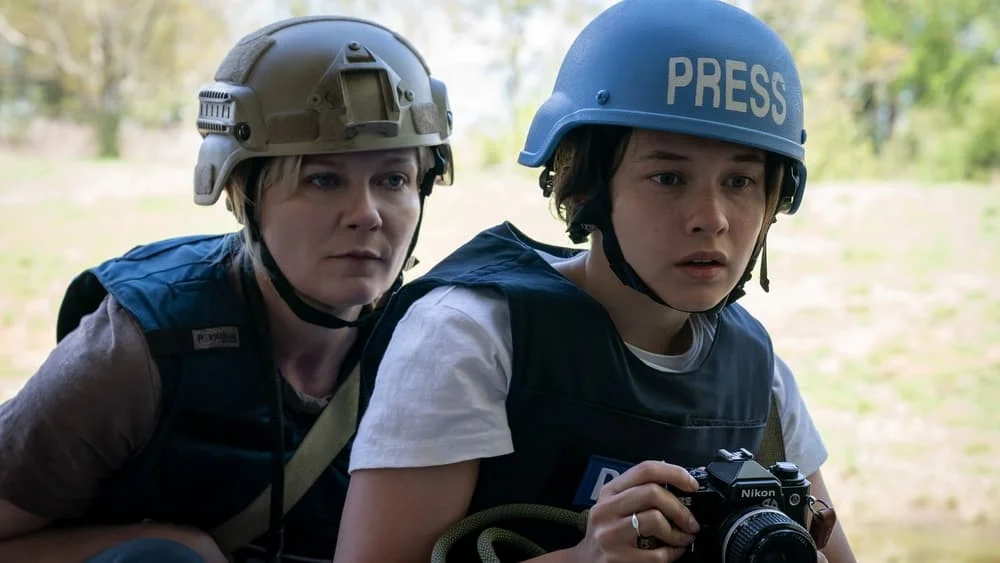I’ll be the first to admit that I liked “Men.” Writer-Director Alex Garland’s previous feature could’ve been alternatively titled “Alex Garland Doesn’t Get Women” but the film’s blasé attitude toward exploring its high-concept setup still works because at its core it is a dumb B movie and can get away with being nothing more than that. Garland’s new film “Alex Garland Doesn’t Get America,” or “Civil War” as it’s known to general audiences, positions itself to be something grander — a timely social commentary about our current political moment and where we could be headed. Maybe Garland never intended the film to be that and that’s why he focuses on a group of journalists rather than politicians, soldiers, or common people. Fair enough, but that movie isn’t nearly as interesting as one that makes use of its fractured-America setting.
For a guy who broke into Hollywood as a writer, Garland’s screenplays sure are sloppy. “Civil War” features one of the clumsiest first acts in a major release in recent memory. It throws you into an America that bears no resemblance to our own and then fails to provide proper context for why the world is like this. We don’t understand how the country has been split, why certain parts of the country are allied and others aren’t, or what led to the conflict in the first place. It’s not that the film needs to have a character (or voice-over narration) explain how the United States got to this point in great detail, but any morsel of information would build out this completely empty vision of a conflicted nation.
Even for the story Garland wants to tell about journalism, we don’t understand how the press functions in this setting, we don’t understand who the audience for this journalism is — the only war non-participants we see in the film are intentionally ignorant of anything going on outside their bubbles — and we don’t understand the main group’s motivations for endangering themselves other than personal glory, which is not all that compelling. The most frustrating part is that the first act of “Civil War” *is* full of exposition, just explaining things that would be more effectively conveyed through implication. Characters tell other characters their entire backstory in Wikipedia summary dialogue that sounds even worse coming out of the actors’ mouths than it would be on the page. If more attention had been given to the world-building than to these nothing characters, the film would be much better off.
For Garland, ambitious concepts are not something he’s interested in exploring, but a marketable mask so he can sell you the story he wants to tell. In the case of “Civil War,” that story is about the neutrality of war photographers and whether or not they can stay neutral. This could be a fresh, interesting take on this type of war story if we knew the conflict they were attempting to stay neutral about, but we don’t. Garland’s approach to his film is the same as the one his cast of reporters take: the images will speak for themselves. Generally, I think he’s got the right idea here, but what’s missing from both the reporters’ images and Garland’s own is context. Without context, all of the images are meaningless. Photos from the Vietnam War are powerful because we know what led up to them. What does getting a shot of the President being executed mean to the viewer if we don’t know anything about him or his policies?
“Civil War” does recover after its rocky start. From moment to moment, Garland does an excellent job of building tension and creating a harrowing visceral portrait of urban warfare. The cast, particularly Kirsten Dunst, perfectly captures the jaded detachment that being face to face with so much unnecessary violence (or maybe not unnecessary, again Garland lazily banks on us bringing that feeling to the movie ourselves rather than giving the viewer enough information to form our own opinions on the conflict) and the toll that has on people.
But those positives are all for nothing, as Garland can’t even muster so much as an ambivalently neutral statement about war or America or journalism. Refusing to pick a side is a statement, even if it isn’t a particularly interesting one. But there isn’t enough in the movie to suggest that that’s what Garland is doing. You don’t have to pick a side if there are no sides. That narrative objectivity clashes badly with the provocative subjectivity of Garland’s filmmaking. I don’t think a film in which Alex Garland tries to make some form of political statement would work because I don’t think he has enough understanding of American culture to say anything meaningful. But a failed attempt would be more interesting than no attempt at all.

